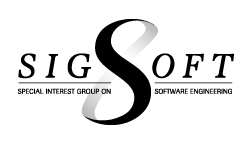Call for Papers
Scope
The CBSE conference has emerged as the flagship research event for the software component community. CBSE 2016 encompasses foundational and applied research that extends the state-of-the-art in component analysis, design, composition, specification, testing, and verification. Experience reports, empirical studies and presentation of component-based benchmarks and case studies are also within scope. At CBSE, participants from industry and academia have the opportunity to exchange ideas and experiences in a variety of sessions including invited and technical presentations, posters, and panel discussions.
New architectural trends in genres such as distributed and cloud-based systems, dynamically adaptable systems, the Internet of things, enterprise information systems, and systems of systems often cross organizational boundaries and push the limits of existing component-based methods, tools and platforms. Innovative solutions from diverse engineering paradigms (e.g., service-, aspect-, and agent-orientation, but also event-, domain- and test-driven approaches) are needed to address these trends.
The available palette of execution platforms and deployment tools is rapidly expanding in many different directions. For instance, emerging technologies such as Docker containers, platform-as-service cloud offerings, and computer boards with high performance and low cost (e.g. Raspberry Pi, Edison boards, Arduino) provide new opportunities to design and deploy distributed component-based systems.
For its special topic, CBSE 2016 focuses on how to leverage component-based system architectures in the context of modern/contemporary execution platforms. This special topic aims at bringing closer application software designers, platform architects and system operators. We solicit contributions that deal with "component-based DevOps", that i) propose approaches to improve a component systems' lifecycle and its management, ii) propose novel component-based architectural platforms and models, and/or iii) take advantage of new kinds of execution platforms or enhance existing or upcoming execution platforms.
Topics
Topics of interest for the conference include (but are not limited to) the following themes:
- Component Software Lifecycle
- Specification, architecture, design of component models and component-based systems
- Non-functional/extra-functional properties and quality attributes in component-based software engineering (e.g. quality-of-service characteristics, service level agreements)
- Cross-cutting component design concerns such as security, deployability, maintainability
- Software quality assurance for component-based engineering; component contracts
- Verification, testing and certification of component-based systems; runtime component management
- Migration to and evolution of component-based software systems (lifecycle management)
- Frontiers and Foundations
- Multi-channel component architectures
- Component composition, binding and dynamic adaptation
- Patterns and frameworks for component-based engineering
- Formal methods for automated component composition and integration
- Methods and tools for component-based engineering - including (but not limited to) continuous integration and delivery, DevOps, 12-factor apps
- Paradigms and Domains
- Component-based engineering with agents, aspects, containers and/or services
- Domain-specific component modelling - including (but not limited to) components for/in wireless and real-time systems, component-based product line engineering, domain-driven design
- Impact of cloud computing, edge computing and fog computing on component architectures
- Component Knowledge Sharing
- Industrial experience using component-based software development - including (but not limited to) lessons learned with Docker, platform-as-a-service offerings, RESTful microservices, Spring componentries, Java Enterprise Edition, .NET, app stores
- Empirical studies in component-based software engineering
- Teaching component-based software engineering
Types of submissions
We solicit two categories of papers: regular papers and short papers.
- Regular papers, not exceeding 10 pages (including appendices), should describe fully developed work. Authors of papers reporting experimental work are strongly encouraged to make their experimental results available for use by reviewers. Similarly, case study papers should describe significant case studies and the complete development should be made available for use by reviewers.
- Short papers of a maximum of 6 pages should describe novel ideas that have not been fully evaluated, or operational tools and their contributions. Tool papers should explain enhancements made compared to previously published work. Authors of tools papers should make their tool available for use by reviewers.
All papers will be evaluated by at least three members of the Program Committee. Papers must describe, in English, original work that has not been published or submitted elsewhere.
Accepted papers will be published in the ACM digital library. A paper must be personally presented at the CBSE 2016 conference by one of the authors in order to appear in the proceedings. The best contribution of the conference will receive the ACM SIGSOFT Distinguished Paper Award, given by the ACM Special Interest Group on Software Engineering.
Publication
Accepted papers will be published by ACM and included in the ACM Digital Library.
Program Committee
See the Organization page.
Important Dates
See the Important Dates page.
Paper Submission
See the Easychair page.
CBSE is kindly supported by ACM SIGSOFT

